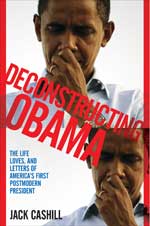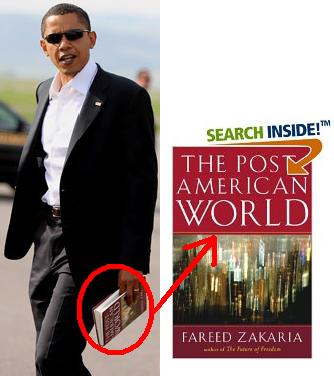Zakaria and Harvard’s
Culture of Corruption: 3.0
Get your copy of Deconstructing Obama

___
Jack Cashill's book:
Hoodwinked: How Intellectual Hucksters have Hijacked American Culture

Click here for signed first edition
©Jack Cashill
AmericanThinker.com - August 14, 2012
First, I will acknowledge up front that this is a revised version of an earlier American Thinker article, which in itself was an update of the information contained in my book, Deconstructing Obama. But as still another Harvard worthy gets busted for literary fraud, I feel compelled to keep updating my scorecard.
The culprit this time is the painfully smug Fareed Zakaria, CNN host, Time Magazine columnist, and Harvard Ph.D. Not surprisingly, Harvard Law’s own Barack Obama is a Zakaria fan. In a famous photo, the president is seen holding a copy of Zakaria’s book (below) , The Post-American World, a world that Obama has been hastening to make a reality.

In brief, Zakaria got caught lifting a passage on gun control from an article by historian Jill Lepore published in April 2012 in the New Yorker. There is a bit of irony here in that the New Yorker, whose editor David Remnick wrote a disingenuous puff biography of Obama, very recently had to fire wunderkind writer Jonah Lehrer for making up Bob Dylan quotes for his bestseller Imagine. Although Lehrer did not attend Harvard, he did graduate, like Obama, from Columbia University.
Speaking of irony and Columbia, the Columbia trustees give out a prestigious annual book prize called the Bancroft Award. Only two or three authors receive the prize each year, and only one has had to give it back. That would be Michael Bellisles, author of the much touted but transparently fraudulent gun control tome, Arming America: The Origins of a National Gun Culture. It seems that to make a convincing case for gun control writers may have to make stuff up.
What stuns the uninitiated about Zakaria’s plight was his seemingly self-destructive sloppiness. He risked his much too felicitous career by publishing an extended passage almost word for word from a piece written just months earlier for a publication with a comparable audience. As Selwyn Duke suggested on these pages , this seems more like the work of an intern than an established author.
If, however, Zakaria farmed out his work to an assistant, he would be following in a well-worn Harvard tradition. If he understands that tradition, Zakaria knows too that he will likely get away with his mischief. Others most certainly have.
Among the unpunished are two prominent mentors to the young Obama at Harvard Law, Charles Ogletree and Laurence Tribe. In August 2004, Ogletree was forced to apologize for somehow letting words from Yale scholar Jack Balkin’s book, What Brown v. Board of Education Should Have Said, seep into his own book, All Deliberate Speed. At Harvard, given Ogletree’s standing, none dared call this plagiarism.
At the University of Massachusetts Law School, however, Dean Lawrence Velvel called it exactly what it was, and he did so said so publicly. Tribe, something of an academic showboat, moved swiftly to defend Ogletree. In a delightful turn of the paddlewheel, Tribe’s showboating caught up with him just a few weeks later. Amazed by the sheer moxie of Tribe’s defense, an anonymous tipster reported that passages from Henry J. Abraham’s 1974 book, Justices and Presidents, had somehow seeped into Tribe’s 1985 book, God Save This Honorable Court.
Forced to review the twin cases, Harvard Law School dean, Elena Kagan—yes, that Elena Kagan--and Harvard president, Larry Summers, faced an obvious challenge: Ogletree was a black star on a faculty often criticized for being overly white, and Tribe was the superstar of the judicial left. Had the plagiarizers-in-residence not been such sacred cows, Harvard would have likely ground them into hamburger.
Instead, Summers and Kagan appointed a chummy insider committee that somehow managed to clear Ogletree and Tribe of wrongdoing. The transgressions, Summers and Kagan agreed, had surely been the “product of inadvertence.” This being so, they thought it time to “consider the matter closed” and move on.
That same April, Velvel re-entered the fray. Wrote he of the administrative response, “it is a travesty. Its language is misleading, its logic miserable, and its spirit corrupt.” What troubled Velvel most was this: Ogletree and Tribe could claim “inadvertence” because both likely had their research assistants write chunks of their books for them. Added Velvel, “Ghostwriting, horribly enough, has become all too prevalent in academia as a general matter.”
The fact that Ogletree used ghostwriters, said Velvel, was “widely accepted.” The case against Tribe was nearly as strong. The many instances of “copycatting” included a 19-word stretch in Tribe’s book identical to a 19-word stretch in Abraham’s earlier book. This struck Velvel as “more like what one would expect of a student than of a Tribe.” He pointed out too that a former Tribe assistant, Ron Klain, had already claimed to have written large sections of Tribe’s God Save This Honorable Court.
Still, Tribe and Ogletree skated. They may have been taking their cues on stonewalling from Pulitzer Prize-winning historian Doris Kearns Goodwin. A Harvard Ph.D. like Zakaria, Goodwin was serving on the university’s governing board in 2002 when rightly accused of a word theft so felonious she should have had her Ph.D. recalled, not to mention her Pulitzer.
When the student editors of the Harvard Crimson went after Goodwin, the inevitable Tribe went after the editors. In 2002, Tribe had reputation enough to matter. With his support and that of other literati, Goodwin wormed her way out of what should have been a career-killer.
Through a combination of dissembling, denial, discreet payoffs to the plagiarized author, and strategic Bush-bashing, she was able to work her way back to network TV and on to the bestseller lists. So deft was the colonic mix that by 2008 Obama could cite "a wonderful book written by Doris Kearns Goodwin” without the slightest sense of taint. Obama apparently likes books by plagiarists.
“That Harvard is setting a very bad example, with all too much of the bad stuff centered in its law school, is all too evident,” wrote Velvel. One unfortunate consequence of this phenomenon was that students like Obama and Zakaria were watching and learning from the masters. Here is how Velvel imagined their thought processes:
On balance, it is well worth it, for on the one side lies fame and fortune, and on the other lies only a slap on the wrist. And, especially if I can hide my misdeeds for years (as seems usually to occur), and in the meanwhile have become a big deal, I am virtually assured of suffering nothing other than a minor slap on the wrist if and when I am finally caught.
One has to wonder whether Obama, when pressed to complete his two books, took his cue from his esteemed Harvard mentors. Did one or the other whisper in his ear, “Have someone else write it. We do this all the time.”
Wherever he got the message, Obama had separate authors craft large parts of both Dreams from My Father and Audacity of Hope, and the Harvard establishment has been no more eager to notice his transgressions than Kagan was those of Tribe and Ogletree. Au contraire, the comically myopic Harvard History chair James Kloppenberg has gushed that the “genius” Obama writes “brilliantly and poignantly” and that “no one who knows him has expressed any doubt to me that both books are his work.”
As Velvel argues, the collective action of these frauds—and he doesn’t even know about Obama’s--is turning Harvard into a joke:
Since it is now known that Harvard professors have plagiarized, copycatted, and pretty certainly have had stuff ghostwritten for them, the bona fides and reputations of nearly everyone at Harvard is called into question, especially people in the law school.
Worse, as I document in my book, Hoodwinked: How Liberal Hucksters Have Hijacked American Culture, what Harvard folks do is pretty much the norm in liberal literary America.
Webmaster's Note: Jack Cashill's Book-TV presentation of "Deconstructing Obama" can be viewed at http://www.c-spanvideo.org/program/298382-1
Editor's note: For a more complete account of this phenomenon, read Jack Cashill's amazing book, "Hoodwinked: How Intellectual Hucksters Have Hijacked American Culture.

